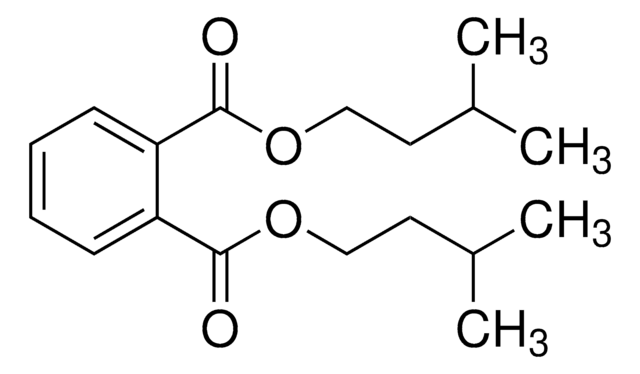About This Item
Recommended Products
grade
for ion-selective electrodes
Quality Level
product line
Selectophore™
Assay
≥99.0% (GC)
≥99.0%
form
liquid
refractive index
n20/D 1.490
density
1.025 g/mL at 20 °C (lit.)
SMILES string
CCCCCOC(=O)c1ccccc1C(=O)OCCCCC
InChI
1S/C18H26O4/c1-3-5-9-13-21-17(19)15-11-7-8-12-16(15)18(20)22-14-10-6-4-2/h7-8,11-12H,3-6,9-10,13-14H2,1-2H3
InChI key
IPKKHRVROFYTEK-UHFFFAOYSA-N
Looking for similar products? Visit Product Comparison Guide
General description
Application
- Biologically relevant reductions in fetal testosterone and Insl3 induced by in utero exposure to high levels of di-isononyl phthalate (DINP) in male rats: Dipentyl phthalate′s structural similarities to DINP underpin studies on phthalate exposure′s impacts on male reproductive health, providing insights into potential risks and mechanisms of toxicity in developmental stages (Earl Gray L Jr, 2023).
- Exposure to dipentyl phthalate in utero disrupts the adrenal cortex function of adult male rats by inhibiting SIRT1/PGC-1α and inducing AMPK phosphorylation: This study uses dipentyl phthalate to examine the adverse effects of phthalate exposure on adrenal gland function, contributing to a deeper understanding of metabolic disruptions (Chen et al., 2023).
- Determination of 15 phthalic acid esters based on GC-MS/MS coupled with modified QuEChERS in edible oils: This research demonstrates the utility of dipentyl phthalate in method development for detecting phthalates in food matrices, enhancing food safety assessments (Wang et al., 2022).
- Development of a putative adverse outcome pathway network for male rat reproductive tract abnormalities with specific considerations for the androgen sensitive window of development: Dipentyl phthalate is investigated for its role in developmental toxicity, aiding in the construction of models predicting reproductive health effects from chemical exposures (Palermo et al., 2021).
Other Notes
Legal Information
Signal Word
Danger
Hazard Statements
Precautionary Statements
Hazard Classifications
Aquatic Acute 1 - Repr. 1B
Storage Class Code
6.1C - Combustible acute toxic Cat.3 / toxic compounds or compounds which causing chronic effects
WGK
WGK 3
Flash Point(F)
244.4 °F - closed cup
Flash Point(C)
118 °C - closed cup
Personal Protective Equipment
Choose from one of the most recent versions:
Already Own This Product?
Find documentation for the products that you have recently purchased in the Document Library.
Customers Also Viewed
Our team of scientists has experience in all areas of research including Life Science, Material Science, Chemical Synthesis, Chromatography, Analytical and many others.
Contact Technical Service














